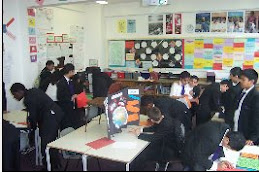First, I bought a series of garden trays, pot plants, seeds and a bag of soil from the local garden centre. The whole of Year 8 had their own plant in my classroom-- that's 180 students -- so the total was about £50. It would be much more reasonable if you do this with only one class. Otherwise, if you know anyone with a garden they might have some of this stuff hanging around so ask about.
When the plants get large you may need to prop them up to keep them growing. You can buy expensive gardening sticks but we used a huge back of straws from the Poundstore!
When the plants get large you may need to prop them up to keep them growing. You can buy expensive gardening sticks but we used a huge back of straws from the Poundstore!
When did you find the time?
I was teaching 'The Environment' in citizenship and used the plants to develop 'nurturing' skills as part of the students' pshe work. However, plants can be related to many subjects - e.g. science, different country's plants for geography, writing poems/stories about the plants in English. Plus, it took less than 20 minutes at the end of the lesson for each student to fill their plant pot from the bag of soil and push their seed into the soil. Afterwards, student's vied for the position of 'daily waterer'.

What were the benefits?
1. Students rushed to see how their plants were growing. This did become a little difficult at first as I would have to peel them away in order to get started. Still, it was better than their drifting in ten minutes late which had been the previous state of play.
2. Students developed genuine responsiblity skills and, those who didn't, saw the consequences when their plants withered. There was an awful moment when the waterer from 8M realised she hadn't watered the plants for a week and the class was faced with almost-dead plants.
3. For the rest of the term, I compared the students' progress on their topic with the progress of their plant. We considered what was the water in our classroom? (e.g. helping each other, being on time, etc). And what things stopped us from growing? (e.g. yelling out). Students grasped 'tracking' in a whole new way.
4. Even an ugly classroom like the one I inherited looks better with plants!

